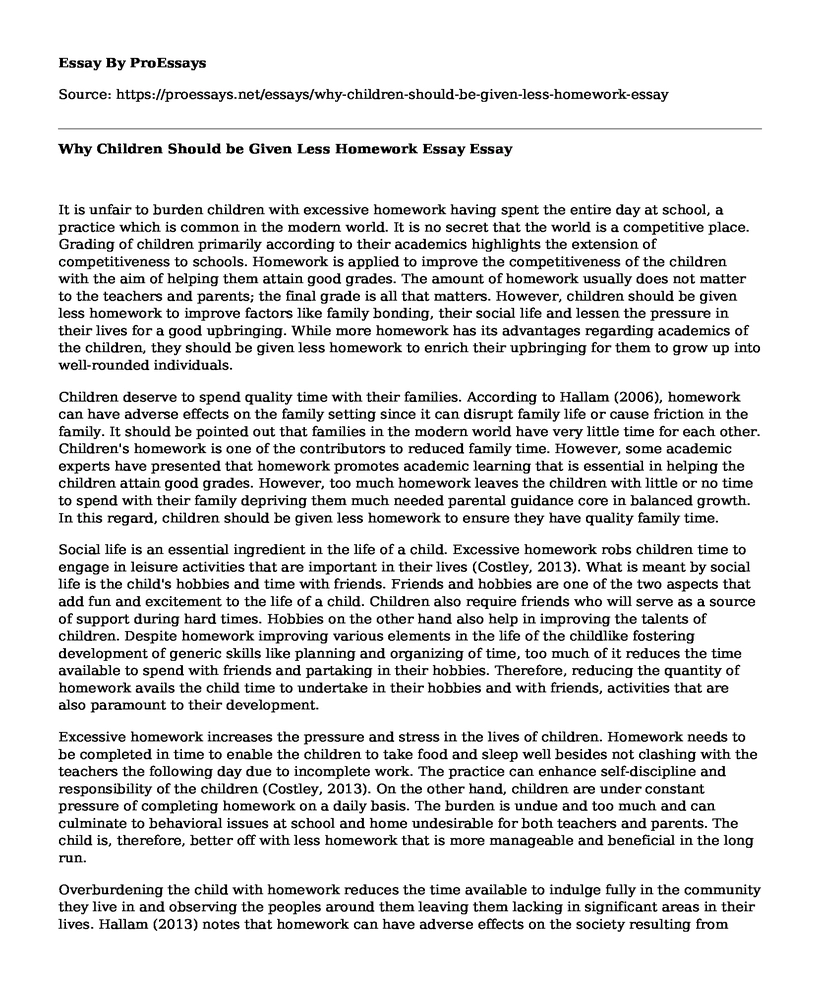It is unfair to burden children with excessive homework having spent the entire day at school, a practice which is common in the modern world. It is no secret that the world is a competitive place. Grading of children primarily according to their academics highlights the extension of competitiveness to schools. Homework is applied to improve the competitiveness of the children with the aim of helping them attain good grades. The amount of homework usually does not matter to the teachers and parents; the final grade is all that matters. However, children should be given less homework to improve factors like family bonding, their social life and lessen the pressure in their lives for a good upbringing. While more homework has its advantages regarding academics of the children, they should be given less homework to enrich their upbringing for them to grow up into well-rounded individuals.
Children deserve to spend quality time with their families. According to Hallam (2006), homework can have adverse effects on the family setting since it can disrupt family life or cause friction in the family. It should be pointed out that families in the modern world have very little time for each other. Children's homework is one of the contributors to reduced family time. However, some academic experts have presented that homework promotes academic learning that is essential in helping the children attain good grades. However, too much homework leaves the children with little or no time to spend with their family depriving them much needed parental guidance core in balanced growth. In this regard, children should be given less homework to ensure they have quality family time.
Social life is an essential ingredient in the life of a child. Excessive homework robs children time to engage in leisure activities that are important in their lives (Costley, 2013). What is meant by social life is the child's hobbies and time with friends. Friends and hobbies are one of the two aspects that add fun and excitement to the life of a child. Children also require friends who will serve as a source of support during hard times. Hobbies on the other hand also help in improving the talents of children. Despite homework improving various elements in the life of the childlike fostering development of generic skills like planning and organizing of time, too much of it reduces the time available to spend with friends and partaking in their hobbies. Therefore, reducing the quantity of homework avails the child time to undertake in their hobbies and with friends, activities that are also paramount to their development.
Excessive homework increases the pressure and stress in the lives of children. Homework needs to be completed in time to enable the children to take food and sleep well besides not clashing with the teachers the following day due to incomplete work. The practice can enhance self-discipline and responsibility of the children (Costley, 2013). On the other hand, children are under constant pressure of completing homework on a daily basis. The burden is undue and too much and can culminate to behavioral issues at school and home undesirable for both teachers and parents. The child is, therefore, better off with less homework that is more manageable and beneficial in the long run.
Overburdening the child with homework reduces the time available to indulge fully in the community they live in and observing the peoples around them leaving them lacking in significant areas in their lives. Hallam (2013) notes that homework can have adverse effects on the society resulting from reduced time for the children to be involved in the activities of the community. Excess homework helps the children learn theoretically a lot about how the community works. However, there is always a technical part of learning different from the theory part of learning. Excessive homework deprives children the freedom that they require to fully explore this part of the world making them grow up to be individuals that are not street smart. It is therefore essential to give children less homework to afford them time to observe and learn from their community.
Conclusion
In the discussion, it is evident that there are other essential things in the life of a child beside school and homework. Excessive homework is equivalent to a thieve that steals time from children to engage with their families, community, and for their social life. Also, the children are subjected to increased pressure as a result. These factors are all detrimental to the growth of children which necessitates the reduction of the quantity of homework. In the light of all these revelations, children should be given less homework to facilitate a healthy upbringing that will result in well-rounded individuals.
References
Costley, K.C. (2013). Does Homework Really Improve Achievement? Arkansas Tech University. 110 Retrieved from: https://files.eric.ed.gov/fulltext/ED54436.pdf
Hallam, S. (2006). Homework: its uses and abuses. Institute of Education, University of London, 110 Retrieved from: https://content.ncetm.org.uk/itt/sec/KeelePGCEMaths2006/Research/Homework%20Research/ReportSusanHallam.pdf
Cite this page
Why Children Should be Given Less Homework Essay. (2022, Aug 23). Retrieved from https://proessays.net/essays/why-children-should-be-given-less-homework-essay
If you are the original author of this essay and no longer wish to have it published on the ProEssays website, please click below to request its removal:
- Impressions of Faith in Relation to an Other Individual's Developmental Processes
- CPS Should Do a Lot to Support Student Living With Disabilities - Article Analysis Essay
- Essay Example on Teen Identity Formation: Exploring Music and Collective Identity
- EBIs for Student Success: The Response Cost Raffle Model - Essay Sample
- Essay Example on Exploring Child A's Height & Weight at Playground
- Essay Example on Fantasia 2000: A Beethoven-Inspired Movie Odyssey
- The RTI Program: A Research-Based Rationale for Improving Student Outcomes







